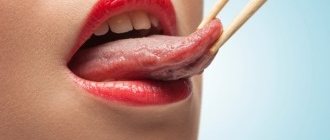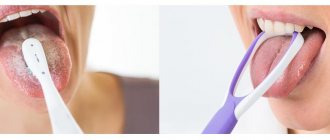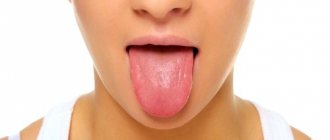Causes of numbness
Let's figure out why the tongue goes numb:
- Temperature burn.
- Damage to the tongue.
- Exposure to chemical reagents.
- The patient had his wisdom tooth pulled out.
- Poor quality oral hygiene product.
- Allergy.
- Pregnancy.
- Age-related hormonal changes.
Cigarettes often make the tongue go numb; smoke has a bad effect on the nerve endings located in the oral cavity.
Pathologies affecting sensitivity
When the tongue or other organ becomes numb, doctors say that the patient has paresthesia. Simple causes of deterioration in sensitivity include mechanical damage. As a result, the ability to transmit impulses deteriorates for a short time, and wicking appears. In case of problems with the nervous system, paresthesia manifests itself without characteristic visual disturbances; this form of the disease is chronic.
Problems with the conduction of nerve impulses occur after the following diseases:
- Stroke.
- Infectious disorders.
- Neurodegenerative defects.
- Neoplasms.
- Autoimmune disorders.
- Results of drinking alcohol.
- Diabetes.
- Metabolic problems.
- Chickenpox.
- There are few useful microelements in the body.
- Osteochondrosis.
In this condition, deterioration in the sensitivity of the tongue may not be the only symptom. When the nervous system is damaged, numbness and tingling occur along the peripheral nerves in various organs.
Deterioration of sensitivity is not an independent disease. Numbness of the tip of the tongue is a symptom that occurs as a result of decreased conductivity of nerve fibers due to pathological factors. This process can increase gradually or occur immediately. Sensitivity worsens only at the tip of the tongue, near the frenulum or on the sides.
What situations can be complicated by numbness of the tip of the tongue?
1. During pregnancy, especially in the last trimester, when cases of increased blood pressure become more frequent and gestosis may be observed. Due to complications, there is temporary numbness of the edge or the entire organ.
2. After undergoing dental interventions related to surgical procedures - surgery, tooth extraction, etc.
3. With acid reflux - a malfunction of the lower alimentary valve, in which hydrochloric acid from the stomach is thrown back into the esophagus, and from there it enters the oral cavity and “burns” the tongue and mucous membrane, resulting in numbness.
4. Nervous pathologies, life in chronic stress, vegetative-vascular anomalies - can be reminded of themselves by periodic numbness of the edge of the tongue.
Therefore, if you have an unpleasant feeling, reconsider your lifestyle; perhaps your nervous system has malfunctioned and is unable to cope with such overloads.
5. Menopause in women. During this difficult time period for any woman, the imbalance of the centers of the autonomic nervous system intensifies.
Active hormonal changes occur, as a result of which the mucous layer becomes thinner and the sensitivity of the tongue tip is impaired.
6. Insufficient hemoglobin level – anemia. With iron deficiency, not only the sensitivity of the tongue changes, but also its color - the tongue becomes bright red, shiny, excessively smooth, lines and “papillae” disappear on its surface.
7. Various allergic reactions. Allergies are many-sided and multifaceted; no one fully knows how and where it can manifest itself. Numbness of the edge of the tongue is often a consequence of the body’s negative response to a known irritant – an allergen.
8. Changing dentures, installing fillings from new materials, aggressive toothpaste or mouthwash. The composition of objects and care products unfamiliar to the body can also cause discomfort.
9. Reaction to pharmaceuticals. Most often, numbness of the tip of the tongue, as a side effect, is observed in people who are undergoing, or have just completed, a course of treatment with antibiotics, antihistamines and other medications.
It is clear that none of the above conditions pose a great danger to human health and life.
In most cases, numbness of the tip of the tongue is temporary and goes away on its own.
In such situations, there are no other alarming symptoms, the patient’s well-being does not deteriorate, and he continues to lead his usual lifestyle.
There are, of course, other diseases that are accompanied by paresthesia of the tongue or its tip, but they require immediate medical attention.
True, against the background of other symptoms accompanying these diseases, numbness of the tip of the tongue causes the least concern.
When your lips go numb
Numbness of the tongue and lips occurs periodically or all the time. This indicates numerous problems in the body. We list the reasons influencing this condition:
- Bell's palsy.
- Consequences of a stroke.
- Migraine.
- Swelling.
- Anemia.
- Nervous disorders.
- Neoplasms
- Hypoglycemia.
- Dental procedures.
Often, numbness of the tongue occurs after going to the dentist.
Paresthesia of lips and tongue
- Acute migraine, in which there is intense headache and numbness of the tongue.
- Bell's palsy.
- Stroke.
- Anemia.
- Hypoglycemia.
- Angioedema.
- Neoplasms of a benign or malignant nature.
- Depression, mental or neurological disorders.
- Consequences of dental procedures.
Why does this happen during dental treatment? Often, after undergoing treatment at the dentist, paresthesia may persist for some time. This happens especially often when a large amount of anesthetic is administered. This is the norm. Some time after the injection wears off, this symptom goes away.
Sometimes, after the third molar has been removed, paresthesia of the muscular organ can also be observed. This condition most often occurs when the teeth are abnormally close to the lingual part of the jaw apparatus. It may remain for a week, after which it goes away on its own. If this does not happen, it is recommended to consult your doctor.
During an acute attack of migraine, the head hurts and paresthesia of the hands and tongue appears. In this situation, it is recommended to undergo diagnosis by a neurologist. If, in addition to paresthesia, a severe headache begins, this may be a symptom of developing hyperinsulinism.
Paresthesia of the muscular organ and throat may be a symptom of the presence of a malignant neoplasm in the larynx. In this case, such a symptom remains constantly, and it is difficult for the person to perform the swallowing function. Numbness of the palate and tongue can occur under the influence of trauma, injury, after prolonged use of certain medications, or after stress.
The cause of paresthesia of the entire oral cavity can be an allergic reaction to certain foods or medications. Treatment involves eliminating the potential allergen.
We suggest you read: What to do if you have an acute toothache at night
All diseases in which the tongue goes numb, numbness of the lower lip and chin manifests itself, are divided into several groups.
Determining the cause of loss of sensitivity by localizing the signs
The tongue may become completely or partially numb. It is necessary to take into account which part of the organ may become numb, since the localization of signs indicates pathology. Paresthesia is characterized by tingling on the tongue, then “running goosebumps” are felt, after which the condition turns into partial or complete numbness.
Sensitivity worsens due to exposure to external factors:
- Tobacco.
- Intoxication.
- Poor ratio of vitamins.
Allergies may be accompanied by swelling and disorder of the mucous membrane.
If patients have a headache, they should contact a neurologist for advice. Paresthesia and migraine indicate a decrease in the amount of insulin and an increase in sugar concentration. In such a situation, you need to consult an endocrinologist.
Paresthesia of the throat and tongue indicates oncology in the larynx. If the sensitivity of the palate worsens, then the patient has an allergy. The root becomes numb when the nerves are touched or injured.
Dizziness and numbness of the tongue occurs with the following diseases:
- Osteochondrosis.
- VSD.
- Neurological problems.
- Stroke, heart attack.
General information
Decreased sensitivity or numbness of the tongue and lips indicate problems that are developing in the body. A person immediately notices if their lips lose sensitivity or their tongue becomes numb.
We suggest you read: Inflammation of the papillae on the tongue, symptoms, causes and treatment
What this means, and what specific diseases may be manifested by a decrease in taste and tactile sensitivity, is best to find out from a doctor. But there are still certain features of this symptom. Thus, the tongue or lips may become numb gradually or almost instantly. Almost always, this symptom is accompanied by other signs of the disease, which makes it possible to facilitate diagnosis.
Sensitivity decreases due to impaired innervation of the lips and tongue. Speaking about whether numbness of the tongue is a sign of what and what diseases it may indicate, a number of factors should be noted: infectious, vascular, mechanical, etc. However, it is important to find out exactly what disease is causing the tongue and lips to numb. The features of this symptom and the diseases in which it manifests itself will be discussed below.
Consequences of dental treatment
Often people have to have their wisdom teeth removed. The complexity of the removal procedure always depends on the location of the figure eights; it is difficult to perform and requires anesthesia.
Causes of numbness may be related to painkillers. Sensitivity is eliminated for some time. Numbness of the palate is also a consequence of dental procedures. This manifestation is not dangerous and is observed for six months, so patients feel discomfort for a long time.
Therapy is not required in such situations. But people need to accurately understand the reasons why the tongue goes numb and that this condition is caused by dental procedures, so as not to miss the appearance of complex pathologies.
The palate in the mouth goes numb - reasons. Tongue and palate go numb: causes, treatment, possible consequences
Are you having any problem? Enter “Symptom” or “Name of the disease” into the form, press Enter and you will find out all the treatment for this problem or disease.
Find:
Causes of the phenomenon
Reasons why the upper palate becomes numb:
- Severe stress;
- Eating food that is too hot, causing a burn to the oral mucosa, which leads to short-term paresthesia;
- Chronic fatigue;
- Poisoning with alcohol or toxic substances;
- Installation of dentures, which can interfere with the functioning of the palate if the procedure is performed incorrectly;
- Injuries, damage to the spinal or cranial nerves;
- Surgery to remove wisdom teeth.
Paresthesia of the palate area is caused by diseases - hypertension, osteochondrosis of the cervical spine, inflammation of the tonsils, damage to the glossopharyngeal nerve.
https://gidpain.ru/nemeet/nebo-rtu-prichiny.html
Numbness of the palate and tongue
Simultaneous numbness of the upper palate with the tip of the tongue occurs when:
- An allergic reaction to a certain component of a medicine, mouth rinse, toothpaste;
- Deficiency of vitamin B and iron in the body;
- Low blood sugar levels;
- Poisoning with chemicals;
- Difficult diabetes mellitus. Lips undergo paresthesia;
- Damage to brain structures or stroke;
- Multiple sclerosis;
- Diseases of the thyroid gland (hypothyroidism);
- Brain aneurysm.
The mucous membranes of the tongue and the entire mouth may swell and lose sensitivity due to disturbances in the functioning of the vegetative-vascular and nervous systems.
Why palate paresthesia occurs and quickly passes
This condition is associated with:
- Reflux esophagitis. The condition is accompanied by the reflux of gastric juice back into the oral cavity. This causes irritation of the mucous membrane, manifested in tingling and a feeling of numbness.
- Drinking large amounts of alcoholic beverages.
- Diseases of the gums or teeth.
- Taking certain medications. Short-term paresthesias are a side effect. Before taking it, it is important to study the instructions for the drug in order to be prepared for this. The described clinical picture is caused by the cough medicine Libexin and the painkiller Bellasthesin.
You need to pay attention to the nature of the numbness: if they appear systematically, then this is a reason to urgently consult a doctor.
Treatment approaches
When you feel numbness in your mouth, it is important to fight not the symptom, but the cause that caused it.
You need to see a therapist or neurologist. Specialists will prescribe diagnostic tests and determine the cause.
The course of treatment depends on the identified disease.
- If there is a lack of vitamins and microelements, vitamin-mineral complexes or vitamin administration by intramuscular injections are prescribed.
- Inflammatory diseases are treated with antibacterial drugs.
- In case of allergic reactions, taking antihistamines is indicated.
- Diseases of the endocrine system are treated with hormone replacement therapy.
To cope with paresthesia of the tongue and palate, you can rinse your mouth with water and sea moth, a decoction of rose hips or St. John's wort. Sea buckthorn oil can be applied to the problem area.
Which doctor should I contact if my tongue goes numb?
Paresthesia is observed in pathologies of the cardiovascular system, changes in the brain or thyroid gland, sclerosis, diabetes mellitus and a number of other diseases.
First of all, you need to visit a general practitioner, who will prescribe further consultation with the right specialist. If the victim is a minor, you must first contact a pediatrician, who will then refer you to the right doctor.
The problem of paresthesia is dealt with by a neurologist, to whom a general practitioner will refer you. First, a neurologist identifies the patient’s complaints, analyzes the medical history, and asks about bad habits and past illnesses. Blood tests and instrumental methods are prescribed.
Examinations for tongue numbness
Because paresthesia is related to circulation, initial diagnostic steps include measuring blood pressure. To identify the problem, sometimes a routine examination by a doctor is enough, but sometimes it is necessary to use more serious diagnostic procedures.
Depending on the nature of the numbness, diagnosis includes the following methods:
- Tongue mobility tests;
- MRI of vessels;
- Identifying other worrying symptoms;
- Ultrasound of blood vessels, which determines the movement and stagnation of blood;
- Electromyography is a method for recording muscle activity.
A neurologist may prescribe an ultrasound scan of the neck vessels and an ultrasound scan of the cervical spine. Diagnostic methods help the specialist to correctly identify the cause of the discomfort and prescribe adequate therapy.
Sometimes paresthesia is a manifestation of another disease, which is detected during a comprehensive diagnosis. There is no specific theory for the appearance of paresthesia, so the prescribed therapy depends on the accuracy of the diagnosis. After identifying the location of the lesion, further research focuses on searching for concomitant diseases.
More research will be needed to determine the exact causes of the symptom. For example, allergen tests.
In many cases, physical therapy is required - it affects the nerve endings. Physiotherapy is aimed at correcting the affected area of the tongue with ultrasound pulses.
For diagnostic accuracy, it is necessary to be examined using magnetic resonance imaging of the brain and cervical spine. If all diagnostic methods have been passed, and paresthesia is still not eliminated, sedatives may be prescribed.
Any proper treatment begins with the elimination of all factors that irritate the organ. There is therapy that includes sedative medications that correct blood circulation. If paresthesia turns out to be a sign of a disease, therapy is prescribed by the appropriate doctor for the current pathology.
Prevention of tongue numbness
To reduce the chances of paresthesia occurring, it is advisable to follow the recommendations for preventing the problem:
- Regularly attend scheduled medical appointments;
- Avoid traumatic factors and stress;
- During pregnancy and menopause, consultation with a gynecologist is important;
- Monitor pressure indicators;
- Take care of your oral cavity;
- In case of the first warning symptoms, seek help from a clinic.
For prevention, it is advisable not to have bad habits and to be aware of your allergic reactions. It is recommended to analyze your daily routine, diet, food and medications consumed, and pay attention to diseases suffered during the last year.
Loss of sensation occurs due to certain components of food and drinks. Even chewing gum or smoking, or animal hair can cause it. For prevention, it is recommended to review the diet and exclude from it foods that irritate the mucous membrane.
A lot of spices and seasonings, overly spicy, salty dishes and foods can provoke irritation of the mucous membranes and the surface of the tongue, causing numbness and discomfort.
A harmonious daily routine and the absence of psycho-traumatic factors are the prevention of many pathologies and uncomfortable phenomena.
Folk remedies
Treatment is prescribed by a specialist in accordance with the cause of the unpleasant symptom. Non-traditional treatment options are not recommended and lead to complications. If the patient is sure that the numbness is caused by overload of taste buds or other irritants, you can relieve the discomfort yourself at home.
When paresthesia is not a symptom of a more complex disease, then traditional methods will help eliminate the unwanted symptom:
- 3 drops of iodine are mixed with 1 teaspoon of baking soda. The mixture is stirred in 250 ml of warmed clean water. Rinse your mouth 2-3 times a day.
- 1 tablespoon dried chamomile, 1 tbsp. A spoonful of oak bark is mixed and poured with boiled water. Cool the liquid, filter and rinse your mouth 2 times a day.
- 1 teaspoon of St. John's wort herb is mixed with 1 teaspoon of celandine. The mixture is poured with boiling water in a volume of 250 ml and left for half an hour. Rinse your mouth 2-3 times a day.
- Apply sea buckthorn, peach or rosehip oil to a cotton pad. Apply to tongue 3-4 times a day.
It is recommended to rinse your mouth with a solution of soda and salt in a 1:1 ratio. The described methods help relieve inflammation and paresthesia. But these remedies are not aimed at treating the underlying disease, the symptom of which is numbness.
To restore sensitivity and relieve swelling, cold compresses are used - an ice pack that is applied to the tongue for 15-20 minutes.
If there is no swelling, you can apply a warm compress to improve blood circulation. To normalize blood flow, you can massage and knead the numb area. Before such a massage, you should wash your hands.
If paresthesia is caused by an allergic reaction, antihistamines are taken.
Sensitivity disorder is a disorder of the nervous system, so sedatives are effective: massage courses, baths with aroma oils, relaxation exercises.
If an unpleasant symptom occurs more than 2 times a month or does not go away within 2 days, it is important to immediately consult a doctor.
We must not forget that even traditional methods can be harmful if their use is not approved by a doctor. Before carrying out self-treatment procedures, it is important to consult with a specialist, undergo diagnostics and identify the causes of the disorder.
Consequences if you do nothing
It is difficult to say what is better - inaction or self-medication. Loss of sensitivity as a symptom is not life-threatening, but if it is a sign of pathology, then the lack of treatment leads to unpredictable consequences.
Without the intervention of a doctor, the first manifestations of the disease lead to severe complications:
- Allergies lead to angioedema, a life-threatening condition;
- Stroke or sclerosis contributes to the patient’s disability or subsequent death;
- Possible development of Bell's palsy, trigeminal neuralgia;
- The presence of inflammation, neoplasm of the oral cavity or larynx cannot be ruled out.
Source: https://GolovaNeBoli.ru/golova/nemeet-nebo-vo-rtu-prichiny-verhnee-ot-chego-onemelo.html
Diseases of the cardiovascular system
Vascular rupture is one of the most dangerous causes of numbness. The mortality rate for such pathologies is the highest. The causes of the disease may vary. We list the accompanying symptoms:
- Paralysis of part of the face on the left or right, while the eye closes and the corner of the mouth droops because the muscles are relaxed.
- Some side of the body goes numb.
- Speech function is lost or worsened.
- People have difficulty moving their arms.
- Poor coordination of movements.
- The human consciousness is oppressed.
Medical care for patients with such signs should be provided immediately, within the first 6 hours from the moment of the attack. With timely support, speech and muscle functions will be restored.
Migraine with aura
Patients with migraine often complain of deterioration in their sense of smell, hearing, and vision. In some cases, numbness of the face, dots and flashes before the eyes appear. The aura occurs an hour before the attack and disappears after the condition has stabilized. Triptans are used to eliminate migraines, but the form of the drug and its amount are determined only by the doctor.
Patients with frequent migraines may have an incorrect diet. You need to stop eating foods that cause headaches. It is advisable to avoid stressful situations at work and in everyday life.
Idiopathic neuropathy
Sometimes, after a medical examination, it is difficult to identify the causes of numbness in the lips. In such situations, people say that half or all of their face is numb. Experts know exactly what needs to be done in such a situation. Often, idiopathic neuropathy occurs due to a cold.
In most cases, patients with Bell's palsy recover without additional therapy, without any consequences. If necessary, in the hospital the patient is given corticosteroids in combination with antiviral drugs. You need to perform facial gymnastics, and rehabilitation will last up to a year.
Idiopathic neuropathy occurs repeatedly in rare cases. When they appear, it is necessary to examine the brain to identify or exclude neoplasms.
Hypoglycemia
Diabetics report numbness in the upper lip when they have problems using insulin. This symptom manifests itself as a result of a decrease in the concentration of glucose in the blood.
Here are the signs of hypoglycemia:
- The appearance of cold and sticky sweat.
- Limbs and face go numb.
- Fingers are shaking.
- Hunger suddenly sets in.
If the glucose concentration is incorrect, people feel worse; it is easy to get rid of this phenomenon. When symptoms of hypoglycemia occur, you need to determine your glucose level; for this, it is recommended to consume about 20 g of sugar, honey, and other sweets at once. Foods with slow-releasing carbohydrates are not suitable. If symptoms of hypoglycemia occur frequently, you need to change the composition and dosage of medications.
Therapeutic technique
Only after eliminating the main cause will it be possible to get rid of the symptom in the form of numbness. For paresthesia it is indicated:
- Physiotherapy.
- Massage.
- Exercise therapy.
- Painkillers.
- Medicines that promote the restoration of bone tissue.
Injuries can be treated with antiseptic mouthwashes or special gels. Antihistamines help get rid of an allergic reaction.
The fight against VSD is carried out with medications that stimulate blood circulation and increase the lumen of blood vessels in the brain. You can change your diet. Introduce a nutritious diet, follow a work-rest schedule, sleep 8 hours a day, and lead an active lifestyle.
Oncology requires surgery and strengthening the body with medications. In the first stages of the disease, endoscopy is performed. If the patient has laryngeal cancer, the damaged fragments are removed. Plastic surgery is used for restoration.
Neuralgia in the area of the trigeminal nerve is treated surgically , often in this case the nerve fibers are destroyed, sometimes radiosurgery or surgery without blood is used.
If your tongue is numb due to diabetes, you need to treat the underlying disease. Patients are given injections or prescribed tablets to stabilize insulin levels in the blood. As a result, it is possible to get rid of the feeling of dry mouth, thirst, and deterioration of sensitivity.
When recovering from serious brain damage, the following actions are performed:
- The patient's blood pressure is maintained at an optimal level.
- The liquid consumed is regulated within 1.5-2 liters.
- ACE inhibitors are prescribed selectively.
- Balanced diet.
- It is necessary to control the amount of glucose as rehabilitation gets worse.
- Prophylaxis to prevent blood clots.
- Sedative treatment to alleviate the psycho-emotional state.
Problems with the cardiovascular system are also expressed in blue lips.
Why does the upper palate of my mouth hurt?
If you lift your tongue up, you can rest against the hard partition between the mouth and nasopharynx. It is necessary to fully pronounce sounds and prevent food from entering the nasal cavity. But ENT doctors note that patients often complain that the roof of their mouth hurts. The reasons vary: from relatively harmless to serious ones requiring medical attention.
Mechanical damage
The hard structure of the palate is covered with a thin mucous membrane, which is easily injured.
© shutterstock
Causes
Causes injuries to the palate:
- solid foods (crackers, nuts);
- fragments of fish or meat bones;
- hot liquids (lovers of “scalding” coffee or tea suffer)4
- swallowing solid objects (small children put small parts of toys in their mouths).
Violation of the integrity of the mucous membrane causes pain discomfort.
Symptoms
The upper palate in the mouth hurts moderately, pain discomfort intensifies while eating or touching.
Patients often note that pain in the palate appears only with mechanical irritation. There are no external signs of changes in the damaged palate: slight redness may appear in the injured area.
Treatment
No specific therapy is required for minor injuries. The patient is recommended to eat soft food, and to prevent secondary infection, rinse with soda solution or use antiseptics (Miramistin, Chlorhexidine).
It is necessary to monitor the condition of the sky. If signs of infection appear (swelling, hyperemia, constant pain), immediately seek medical help.
For uninfected minor injuries, the palate will not hurt much and medication is not required . If pain discomfort causes inconvenience, then in the first days you can take an analgesic tablet without exceeding the therapeutic dosage.
Who to contact
For minor injuries, medical attention is not required; you need to rinse your mouth and eat soft foods. If the palate begins to swell and become inflamed, you should consult a dentist or ENT specialist.
Dental pathologies
Rare visits to the dentist and lack of attention to problems in the oral cavity lead to pain in the roof of the mouth.
© shutterstock
Symptoms
In addition to pain in the upper palate, a person develops signs characteristic of the disease that provoked inflammation:
- toothache due to caries or periodontitis;
- swelling and painful discomfort of the gums if the cause is gingivitis.
- a swelling on the roof of the mouth hurts while eating, when a cyst of the upper jaw appears (pain in a calm state only appears if the formation is large).
In most cases, increased pain is preceded by dental intervention.
Therapeutic measures
Treatment consists of eliminating provoking factors:
- treatment of diseased teeth;
- eliminating inflammation in the gums and bone tissue;
- surgical removal of the cyst.
After eliminating the problem, patients are prescribed antibacterial agents and rinses with antiseptics.
To treat the oral cavity, doctors recommend additionally using herbs: chamomile, sage, calendula.
For severe pain, it is prescribed to take analgesics or NSAIDs.
Cold infections
People often complain that their palate hurts when they have a cold. Combat syndrome will occur due to acute swelling of the nasopharynx tissue.
© shutterstock
Stomatitis
The disease is more often diagnosed in young children and in people with weakened immune systems.
© shutterstock
Who will help
If characteristic signs of thrush appear, you should visit the dentist.
Neuralgia of the facial nerve
One of the common reasons why there is pain in the palate while eating.
© shutterstock
Where to go for help
Treatment of the facial nerve is carried out by a neurologist, and if the symptoms are caused by gumboil or incorrectly selected dentures, then the help of a dentist is necessary.
Psychological factor
A person complains of pain in the roof of his mouth, and when doctors begin to investigate, they cannot identify signs of the disease.
© shutterstock
Why does the sky still hurt?
Let's look at less common causes of pain in the palate:
- Otitis. Ear pain radiates to the sky. If the right ear is inflamed and the palate on the right side hurts, then after treating the underlying disease, the symptom that has arisen will disappear.
- Neoplasms. A lump appears in the sky. If the formation grows quickly and hurts, then more often this is a sign of a cancerous process.
- Smoking. Nicotine tar and hot smoke constantly irritate the palate.
- Allergic manifestations. The palate swells and hurts, there is difficulty breathing and increased formation of mucus in the nasal cavity.
In case of short-term, one-time palatal pain without external signs of changes in the organ, there is no need to worry; the reason for examination should be the frequent appearance of painful discomfort in the palate.
When to go to the doctor
People react to pain differently: some cannot tolerate even mild pain discomfort, while others seek help only when the pain is severe. Doctors recommend that you undergo an examination if the following signs appear :
- the palate is swollen and painful;
- the mucous membrane is hyperemic;
- there are visible damages (punctures, scratches);
- a spot suddenly appears on the roof of your mouth and does not go away for a long time;
- when running the tongue along the palatal mucosa, unevenness and roughness are felt;
- a bump appeared in the sky.
Palatal pain can be a concomitant symptom of various diseases, and may indicate the presence of pathologies of the hard septum. If your palate hurts frequently, you should not ignore the symptoms that arise.
Source: https://PrichinyBolej.ru/338-pochemu-bolit-nebo-vo-rtu.html
Use of traditional medicine
Taking into account the cause of numbness in the tips of the tongue or the lateral surfaces, therapy involves alternative medicine. Rinses and compresses can make you feel better.
Common traditional medicines used for oral diseases:
- Soda with iodine is poured into water and used to rinse the mouth every day in the morning and before bed.
- If numbness of the tongue is caused by disorders of the nervous system, sage and chamomile should be used for treatment. Such plants soothe and help relieve inflammation. A few spoons of dried flowers are brewed for about 15 minutes. The tincture is used for rinsing, you can drink 1 tbsp. lie in a day.
- Celandine and St. John's wort are poured with boiling water, brewed for half an hour, and used for rinsing.
- The sensitivity of the tongue is restored with garlic. One clove should be rolled in your mouth for several minutes 3 times a day. After garlic, sea buckthorn oil is applied to the tongue to prevent possible irritation of the mucous membrane.
- The dried thigh is filled with water and cooked for 5 minutes. The broth is filtered and cooled. Rinse several times a day, then 1 tbsp. lie The tincture is drunk.
Numbness of the tongue is a symptom of a complex disease, and not a separate disorder. It is necessary to determine the main reason that provoked the deterioration in sensitivity. This can only be done by a qualified specialist. Therefore, you need to consult a doctor as soon as possible for diagnosis and selection of an appropriate treatment method. If you determine in time why the tongue is numb and choose the appropriate therapy, the pathology will not develop.
Treatment
Since numbness is a symptom, therapy will initially be aimed at the cause that led to this.
Usually the doctor prescribes complex therapy, including not only medications, but also homeopathic methods. In many cases, if numbness appears as a result of minor disorders, traditional methods help.
To relieve numbness, drugs are used that restore metabolic processes in the nerves, promoting better absorption of vitamins and macroelements into the blood and lymph. Treatment depends on the diagnosis.
For example, if tongue dysfunction is caused by dysfunction of blood vessels or the heart, then various vitamin complexes or massage are prescribed.
In the case where parasthenia occurs as a result of osteochondrosis, the most effective method is to use massage of the collar area and special physical exercises such as regular exercises.
In case of numbness as a result of prolonged exposure to carcinogens (smoking, drinking alcoholic beverages), the patient should completely eliminate them from their lifestyle and restore the body’s natural strength with the help of a proper diet and vitamin complexes.
Medication
Drug treatment is used when the nerves are affected.
Therapy includes:
- Drug treatment is used when nerves are affected
Vitamin complexes (Prescribed individually, the dose depends on the typology of the disease. There will be different complexes if numbness of the tongue is caused by pregnancy or a climatic pause, or hormonal imbalance for another reason);
- Carbamesepon (The drug inhibits neuronal populations, is used to treat the trigeminal nerve. Initially, the dose is minimal, but gradually increases);
- Ambene (a drug containing phenylbutazone and cyanocobalamin allows you to fight diseases of the cervical spine, in particular osteochondrosis and osteoporosis. The medicine is administered intramuscularly, the dose is calculated individually);
- Cavinton (Allows the dilation of brain vessels. Tablets are taken several times a day, the course of treatment can last up to several months).
Physiotherapeutic
Physiotherapeutic methods have been successful in combating tongue numbness caused by psychological reasons.
They use various types of air baths, hydrotherapy, and the use of magnetic waves. All these actions are aimed at normalizing the functioning of the nervous system and general calming of the person.
Homeopathic
Homeopathic treatment allows you to eliminate the disease and its symptoms with the least risk. The effect of homeopathic medicines is less effective than medications, however, they do not cause negative reactions.
The course of treatment lasts at least a month.
They use the drug Nervohel, which helps treat vegetative-vascular dystonia and other heart diseases, Stonciana Carbonica to treat osteochondrosis, Gelarium Hypericum to restore psychological balance.
Various compositions that remove waste and toxins also have a positive effect on the patient.
Doctors' advice
Differential diagnosis can only be carried out in specialized institutions, so if your tongue is numb, you should consult a doctor. First you need to go to an ENT specialist or dentist. After ruling out problems with teeth or ENT organs, examinations by other doctors are prescribed:
- Endocrinologist.
- Cardiologist.
- Surgeon.
If the patient has no underlying pathologies, you can independently get rid of tongue numbness using the following methods:
- Oral hygiene.
- Treating the tongue with sea buckthorn oil.
- Rinse with herbal infusions.
- Changing your diet.
Today, many pathologies are more common in younger age groups. Even teenagers experience changes during puberty and hormonal changes. There are many reasons for tongue numbness.
Other forms of paresthesia
With additional numbness of the face, one can judge the development of disorders in the vascular system or in the nerve endings. If this condition extends to the tongue, the reasons may be:
- Bell's palsy. This disease is a consequence of infectious diseases and is accompanied by inflammation of the nerves.
- Multiple sclerosis is an autoimmune disease that results in the thinning or destruction of the protective covering of the nerves.
- Trigeminal neuralgia.
- A stroke in which a blood vessel ruptures or becomes blocked.
- Damage to the ophthalmic, mandibular or maxillary nerve.
Why does half of the tongue lose sensitivity? Unilateral damage occurs when the lingual nerve is damaged. With osteochondrosis, this symptom appears very often. The development of cervical osteochondrosis is caused by pinching of the endings of the spinal nerves. With osteochondrosis, the following symptoms usually appear:
- paresthesia in the mouth;
- dizziness;
- intense headaches;
- pain in the chest or neck during sleep and while awake;
- lumbago;
- sleep is disturbed, chronic insomnia appears;
- stiffness of movement, the affected part of the neck can be very painful.
What to do? Patients should consult a specialist and undergo appropriate treatment, after which the accompanying symptoms go away on their own.
If dizziness and headaches additionally appear, this may be a sign of developing vegetative-vascular dystonia and neurological diseases. Therefore, you should not delay contacting a doctor to find out why such symptoms appeared.
The answer to the question of why the face or tongue goes numb may be other diseases. The tongue and lips sometimes become numb due to mechanical compression by the neoplasm. A tumor can develop in the brain, and then damage occurs to the nerve centers that determine the sensitivity of a certain part of the body.
When determining the causes of facial numbness, the doctor must necessarily exclude neoplasms of the neck and head. Therefore, you should not think long about what to do if you constantly feel numbness on the right side of your face or the left side loses sensitivity. It is important to get tested as soon as possible.
You should be alert and consult a doctor in time if your head becomes numb. The reasons for this may also be related to the tumor. Therefore, numbness in the head, which occurs regularly, is a reason to visit a doctor.
More rare causes of numbness in the tongue, upper and lower jaw, and even numbness in teeth are Lyme disease, sarcoidosis, oropharyngeal tumors, preeclampsia, and other diseases.
Only a specialist in a medical institution can carry out differential diagnosis. Therefore, it is important to determine the causes of numbness in the cheeks, lips, and tongue as soon as possible.








